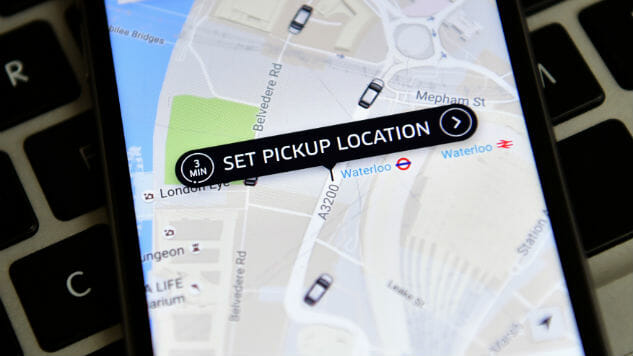Greyball Reveals How Uber Has Been Dodging City Authorities
Photo by Carl Court / Getty Images Tech Features Uber
Can you remember the last time you went a week without seeing some headline about an Uber controversy or misstep?
It’s become a calling card of sorts as the ride-hailing app jostles with scandal after scandal whether it’s accusations of sexual harassment in its offices or taxi drivers taking to the streets to protest against its service. A recent New York Times profile of CEO Travis Kalanick was particularly illuminating, including a bust-up with Apple over clandestine tracking of Uber users that had deleted the app.
Another controversy that has been brewing relates to Greyball, a secretive piece of software that Uber used to detect and avoid city officials hailing a ride from one of its drivers. First reported by the Times back in March, the software has got Uber into trouble once again as federal investigators have begun poking around over the last few weeks.
Uber has always had a tumultuous relationship with city governments. The company apparently used Greyball for years to try and identify city officials and law enforcement officials so that these people could not hail rides from its drivers. The software was employed mostly in cities where Uber’s legal standing was questionable to avoid authorities that were trying to clamp down on the service.
Greyball was used in several US cities but also globally in cities such as Paris, where Uber has faced particularly strong opposition, and in countries like China where it has been keen to try and gain a stronger foothold.

Photo by Justin Sullivan / Getty Images.
Greyball was one component of a program called VTOS (violation of terms of service), initially designed to detect people that are violating the app’s terms.
In 2014, Uber had just launched in Portland without the proper approvals. Erich England, a city official, was tasked with carrying out a sting operation by posing as a regular user looking to hail a ride. However, England and other officials were ‘greyballed’—they had been identified as authorities so no Uber drivers were alerted to their ride requests.
One supposed method of identifying possible cops or investigators was geofencing public office buildings and monitoring use of the app in this space. It also allegedly viewed users’ payment information for possible links to bodies like a police credit union.
In response, Uber has stopped using the software but still stuck to its guns saying VTOS was used to protect its drivers, protect itself against competitor sabotage, and “opponents who collude with officials on secret ‘stings’ meant to entrap drivers.”
However it’s not off the hook. Late last week, the City of Portland announced that it now plans to subpoena Uber to reveal Greyball to the world. This came just a day after the Department of Justice launched its own investigation into the matter while Uber received a subpoena from a grand jury in Northern California. Over the last few days, more cities have started to take notice with the federal investigation spreading into Austin and Philadelphia. In Europe, one MEP has written to the European Commission requesting an investigation into Greyball.
In an ironic twist, the piece of software that was designed to evade city authorities is now bringing the weight of officials and courts down on the company.
It’s just the latest chapter in Uber’s seemingly never-ending quarrels with city governments. In the US and globally, the company continues to lock horns with councils and courts in cities where it’s ride-hailing service is either illegal or in a legal grey spot.
In Texas, Uber clashed with Houston over background checks on its drivers that would require fingerprints being collected. Uber, which has always been about quick efficiency, stood against what it called cumbersome rules for its drivers. Since then statewide law proposals in Texas have emerged that do not require fingerprints and they appear likely to pass.

Photo by Robert Prezioso / Stringer / Getty Images.
Uber has always subscribed to the philosophy of seeking forgiveness not permission. This mindset has continued to land the company in sticky situations. In Paris, taxi drivers have blocked the streets in protests against Uber and its business model. The situation got so bad that the French government eventually intervened asking Uber to hear out the taxi drivers’ concerns. In the UK, London’s black cab drivers have staged similar protests and UK courts have ruled against Uber’s classification of its drivers as contractors, not employees.
Most recently Denmark came down on Uber, leading to the app pulling all operations from the country. It has been a similar case for the company elsewhere in Scandinavia where police in Norway have been cracking down on UberPOP drivers.
Despite all of these issues, Uber has continued to weather the storm. It’s valued at around $70 billion and people are still using the app but the criminal investigation into Greyball could turn up the heat more than ever. However this isn’t the first time we’ve said that.